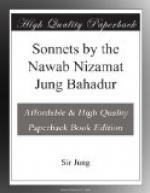“Love wakes the soul and gives it wings to fly.”
“All beauty that to human sight
is given
Is but the shadow, if we rightly see,
Of Him from Whom man’s spirit issueth.”
“As heat from fire, my love from
the ideal
Is parted never.”
“Oh noble spirit, noble semblance
taking,
We mirrored in Thy mortal beauty see
What Heaven and earth achieve in harmony.”
Thus wrote Michelangelo of Vittoria Colonna (Marchioness of Pescara), “being enamoured of her divine spirit";[B] and though in the Sonnets of the Nawab, who uses what is for him a foreign tongue, the ideal is sometimes greater than the expression of it, yet the spirit shines out with a light which none can mistake. And whether the average man accepts or rejects the standards therein embodied, lovers of poetry will recognise that the Nawab, in his championship of a high and noble ideal, fights in the same army as Dante and Michelangelo,—neither of them cloistered dreamers, neither of them arm-chair theorists, but men who lived and loved and suffered amidst the turmoil of a world they viewed with wide-open eyes and unflinching minds.
The chivalrous ideal of an exalted and inspiring love can be rejected if we please;—but let none claim to be manly because this ideal seems too ethereal. For it is by the most vigorous, most strenuous, and most commanding souls and minds that this faith in the Eternal Beauty has been cherished and upheld most ardently and resolutely.
September 29, 1917.
FOOTNOTES:
[A] See “Note on the History of the Sonnet in English Literature,” below.
[B] Ascanio Condivi’s “Life of Michelangelo Buonarroti.”
NOTE ON THE HISTORY OF THE SONNET IN ENGLISH LITERATURE
Now that Italy holds such a brilliant place among our Allies during this the greatest war in the world’s history—the war of chivalry (which is to say moral and spiritual right) against the arrogant might of the Prussian Octopus,—it is well to remember that it was from Italy the Sonnet first came into England. The word sonnet in fact, is from the Italian sonetto (literally “a little sound"), and the sonetto was originally a short poem recited or sung to the accompaniment of music, probably the lute or mandolin.
Whether its birth should be attributed to Italy or Sicily,—or to Provence, the cradle of troubadour poetry,—is a subject on which the learned may still indulge in pleasant controversies. But in Italy, towards the end of the thirteenth century, it had already become a favourite mode of expression; and some forty years later, in a manuscript treatise on the Poetica Volgare (written in 1332 by a Judge in Padua), sixteen different forms of sonnet were enumerated as then in current use.




